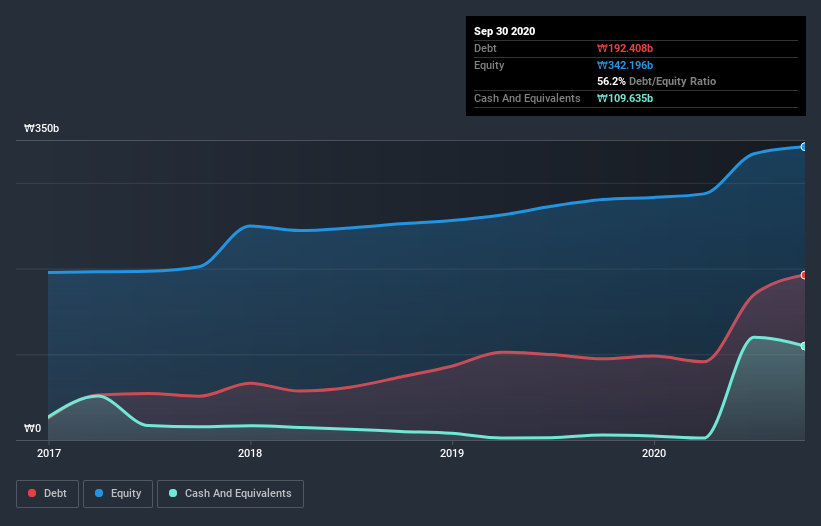- South Korea
- /
- Pharma
- /
- KOSE:A003850
Boryung Pharmaceutical (KRX:003850) Has A Pretty Healthy Balance Sheet

Legendary fund manager Li Lu (who Charlie Munger backed) once said, 'The biggest investment risk is not the volatility of prices, but whether you will suffer a permanent loss of capital.' So it might be obvious that you need to consider debt, when you think about how risky any given stock is, because too much debt can sink a company. Importantly, Boryung Pharmaceutical Co., Ltd. (KRX:003850) does carry debt. But should shareholders be worried about its use of debt?
When Is Debt Dangerous?
Debt assists a business until the business has trouble paying it off, either with new capital or with free cash flow. In the worst case scenario, a company can go bankrupt if it cannot pay its creditors. However, a more usual (but still expensive) situation is where a company must dilute shareholders at a cheap share price simply to get debt under control. Having said that, the most common situation is where a company manages its debt reasonably well - and to its own advantage. The first step when considering a company's debt levels is to consider its cash and debt together.
View our latest analysis for Boryung Pharmaceutical
How Much Debt Does Boryung Pharmaceutical Carry?
As you can see below, at the end of September 2020, Boryung Pharmaceutical had ₩192.4b of debt, up from ₩94.7b a year ago. Click the image for more detail. However, because it has a cash reserve of ₩109.6b, its net debt is less, at about ₩82.8b.

How Healthy Is Boryung Pharmaceutical's Balance Sheet?
Zooming in on the latest balance sheet data, we can see that Boryung Pharmaceutical had liabilities of ₩148.9b due within 12 months and liabilities of ₩192.7b due beyond that. Offsetting these obligations, it had cash of ₩109.6b as well as receivables valued at ₩125.1b due within 12 months. So it has liabilities totalling ₩106.8b more than its cash and near-term receivables, combined.
Given Boryung Pharmaceutical has a market capitalization of ₩1.05t, it's hard to believe these liabilities pose much threat. But there are sufficient liabilities that we would certainly recommend shareholders continue to monitor the balance sheet, going forward.
In order to size up a company's debt relative to its earnings, we calculate its net debt divided by its earnings before interest, tax, depreciation, and amortization (EBITDA) and its earnings before interest and tax (EBIT) divided by its interest expense (its interest cover). The advantage of this approach is that we take into account both the absolute quantum of debt (with net debt to EBITDA) and the actual interest expenses associated with that debt (with its interest cover ratio).
Boryung Pharmaceutical's net debt is only 1.2 times its EBITDA. And its EBIT covers its interest expense a whopping 22.0 times over. So we're pretty relaxed about its super-conservative use of debt. Also good is that Boryung Pharmaceutical grew its EBIT at 11% over the last year, further increasing its ability to manage debt. There's no doubt that we learn most about debt from the balance sheet. But ultimately the future profitability of the business will decide if Boryung Pharmaceutical can strengthen its balance sheet over time. So if you want to see what the professionals think, you might find this free report on analyst profit forecasts to be interesting.
Finally, a company can only pay off debt with cold hard cash, not accounting profits. So we always check how much of that EBIT is translated into free cash flow. During the last three years, Boryung Pharmaceutical burned a lot of cash. While investors are no doubt expecting a reversal of that situation in due course, it clearly does mean its use of debt is more risky.
Our View
Boryung Pharmaceutical's conversion of EBIT to free cash flow was a real negative on this analysis, although the other factors we considered were considerably better. In particular, we are dazzled with its interest cover. Considering this range of data points, we think Boryung Pharmaceutical is in a good position to manage its debt levels. Having said that, the load is sufficiently heavy that we would recommend any shareholders keep a close eye on it. The balance sheet is clearly the area to focus on when you are analysing debt. However, not all investment risk resides within the balance sheet - far from it. Case in point: We've spotted 2 warning signs for Boryung Pharmaceutical you should be aware of.
Of course, if you're the type of investor who prefers buying stocks without the burden of debt, then don't hesitate to discover our exclusive list of net cash growth stocks, today.
If you’re looking to trade Boryung Pharmaceutical, open an account with the lowest-cost* platform trusted by professionals, Interactive Brokers. Their clients from over 200 countries and territories trade stocks, options, futures, forex, bonds and funds worldwide from a single integrated account. Promoted
Valuation is complex, but we're here to simplify it.
Discover if Boryung might be undervalued or overvalued with our detailed analysis, featuring fair value estimates, potential risks, dividends, insider trades, and its financial condition.
Access Free AnalysisThis article by Simply Wall St is general in nature. It does not constitute a recommendation to buy or sell any stock, and does not take account of your objectives, or your financial situation. We aim to bring you long-term focused analysis driven by fundamental data. Note that our analysis may not factor in the latest price-sensitive company announcements or qualitative material. Simply Wall St has no position in any stocks mentioned.
*Interactive Brokers Rated Lowest Cost Broker by StockBrokers.com Annual Online Review 2020
Have feedback on this article? Concerned about the content? Get in touch with us directly. Alternatively, email editorial-team (at) simplywallst.com.
About KOSE:A003850
Boryung
Engages in the manufacture and sale of pharmaceutical products in South Korea and internationally.
Flawless balance sheet with solid track record.
Market Insights
Community Narratives




